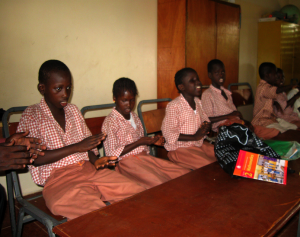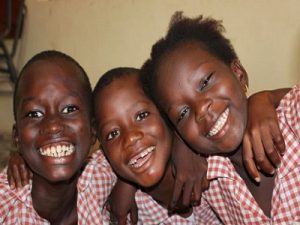BACKGROUND HISTORY
 Govi Resource Centre for the Blind is the only school for the blind in the Gambia where visually impaired children in the Gambia have access to attend a special needs education school from pre-school up to grade 4 where they are later integrated into the mainstream schools to complete their education . The school came into existence in the 70s when there were two societies namely: The Gambia Society for the Blind and the Gambia Association of the Blind They work hard to see that visually impaired persons were given the access to be educated. The whole idea started when some of these children were given the chance to attend a mainstream education in Banjul where these children were integrated at Campama primary School then, and formally called Campama School for the Blind. Many visually impaired students had passed through this school and had now realised their goal of becoming independent through education
Govi Resource Centre for the Blind is the only school for the blind in the Gambia where visually impaired children in the Gambia have access to attend a special needs education school from pre-school up to grade 4 where they are later integrated into the mainstream schools to complete their education . The school came into existence in the 70s when there were two societies namely: The Gambia Society for the Blind and the Gambia Association of the Blind They work hard to see that visually impaired persons were given the access to be educated. The whole idea started when some of these children were given the chance to attend a mainstream education in Banjul where these children were integrated at Campama primary School then, and formally called Campama School for the Blind. Many visually impaired students had passed through this school and had now realised their goal of becoming independent through education
SCHOOL MOTTO: TO MAKE THE IMPOSSIBLE POSSIBLE
This we belief that children can conquer to take a place in our race as they are being discriminated in society and for that being the case, society has low expectation from them.
SCHOOL VISION STATEMENT
Govi Resource Centre for the Blind is a school of excellence, dignity and motivation in which parents are pleased to send their visually impaired children to be taught to become valuable citizens who can contribute to society, the school aims to uplift the academic, social as well as morale standards of our pupils, create a conducive learning environment, provide adequate, relevant, appropriate teaching/learning materials for all our students at different educational levels, develop the capacity of teachers through school base workshop, enhance discipline for both staff and pupils, sensitize parents on the importance of education of their children to help maintaining regularity and punctuality of pupils to school so as to meet the stipulated contact hours
SCHOOL POLICES AND ACTIVITIES
SUCCESS STORIES
 Visually impaired children are only admitted to the resource centre upon presenting the school authorities with evidence of a medical report that satisfy us that he/she cant benefit from reading print or the child to be a totally blind person. Children are enrolled at age three to the pre-school. In the primary school, age determination is not considered, hence some children may develop blindness when they were in normal schools and has to be admitted upon referring them to the school. In the school our means of presenting lessons is in Braille. Children at the school are introduced to Braille reading and writing upon admission to the school. We also teach them Orientation and Mobility (O&M) exercise in order to make them aware of the school environment and their homes so that they can move independently.
Visually impaired children are only admitted to the resource centre upon presenting the school authorities with evidence of a medical report that satisfy us that he/she cant benefit from reading print or the child to be a totally blind person. Children are enrolled at age three to the pre-school. In the primary school, age determination is not considered, hence some children may develop blindness when they were in normal schools and has to be admitted upon referring them to the school. In the school our means of presenting lessons is in Braille. Children at the school are introduced to Braille reading and writing upon admission to the school. We also teach them Orientation and Mobility (O&M) exercise in order to make them aware of the school environment and their homes so that they can move independently.
We also teach these children Activities of Daily Living Skills (ADLS) which is very useful for them in making them realize that they can take care of themselves at home. Among these activities include: personal hygiene, dressing, make-up, cooking etc. We also teach these children crafting skills to enable them use their skills and talent not only in the classroom but in artistic work such as Basketry , Rug making, Gardening and Music. Thus all these subjects are inculcated to the education curriculum of the Gambia and of course the core subjects such as Maths, English, Integrates studies etc.
 Since the inception of the school, there have been very positive results regarding the advocacy of taking visually impaired children of the Gambia to school. Many of the students who had passed through this institution have now realised their dream of becoming independent morally, socially educationally and economically. We had students who had gained their PhD degrees and are in overseas countries showcasing their talents.Here at home we have realized many of them in the teaching field and other works of life in the civil service.
Since the inception of the school, there have been very positive results regarding the advocacy of taking visually impaired children of the Gambia to school. Many of the students who had passed through this institution have now realised their dream of becoming independent morally, socially educationally and economically. We had students who had gained their PhD degrees and are in overseas countries showcasing their talents.Here at home we have realized many of them in the teaching field and other works of life in the civil service.
Here in the school, five of the teachers are visually impaired who served as role models in encouraging these children to take up their education seriously. We do have some of them in the media as journalists, scripts etc. others are in the judiciary as clerks, interpreters, a magistrate etc. some as musician and some at the university pursuing to become lawyers.

